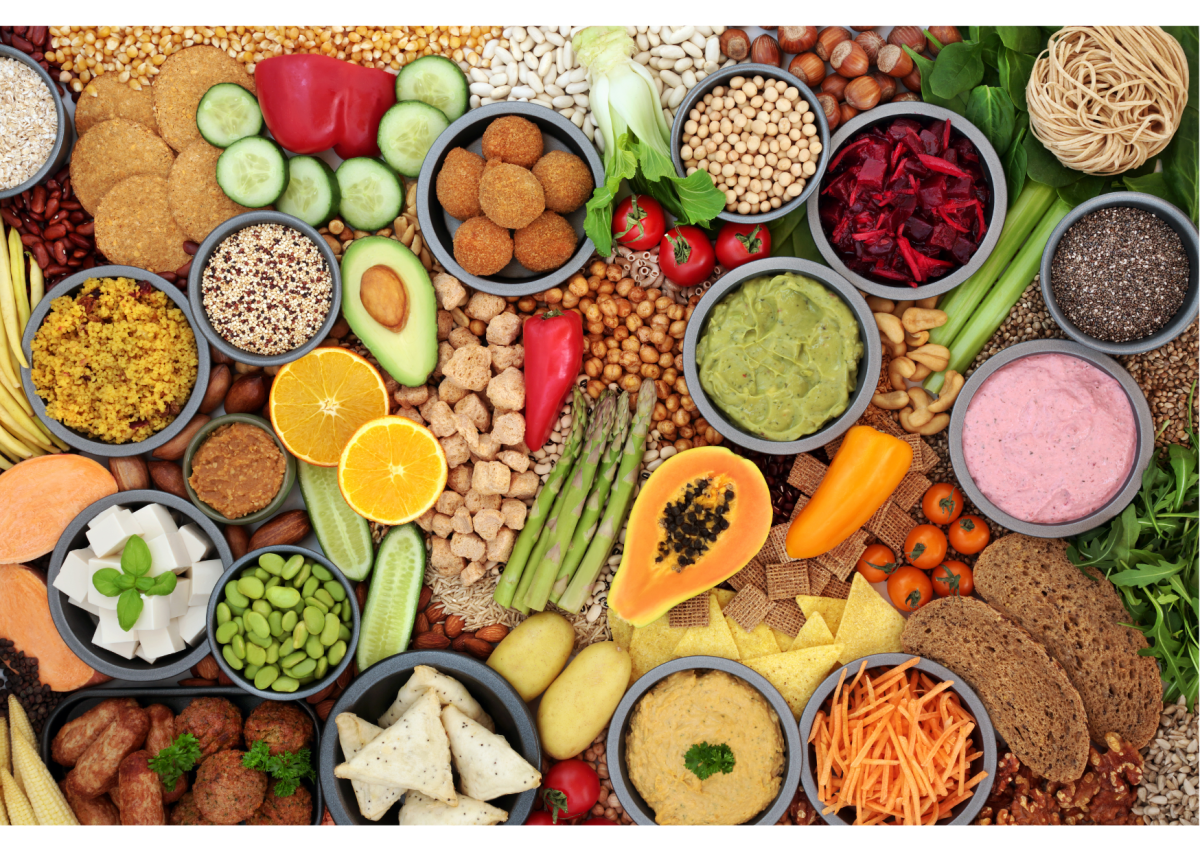What are plant points and how can I get them into my diet?
- Dietary Advice (non Low FODMAP)
Have you heard of “plant points’?
Do you want to get more plant points into your diet but are not sure how?
This blog will cover what these points mean and how you can support your gut health through plant-based eating within your diet.
There are many ways to increase your plant-based food intake, so read on and get some ideas below.

WHAT ARE PLANT POINTS?
Research shows that having different plants in your diet per week is the optimal amount for your health (1).
The term ‘plant point’ is used to refer to something in your diet which counts towards one of these thirty different types of plants.
What counts as a plant point is any item that contains plant-based ingredients, from any of the plant groups below;
- Whole Grains e.g. oats, wheat, buckwheat, rice etc
- Fruits
- Vegetables
- Beans and pulses
- Nuts and seeds
- Herbs and spices (¼ point per herb or spice)
Tea and coffee also count towards a point too.
It is important to note that having the same type of plant in your diet multiple times still only counts as 1 point.
For example, if you had apples twice in the past week, they would only count towards 1 point.
WHY INCLUDE PLANT POINTS?
There is currently limited credible evidence specifically looking at plant intake and the impact on your gut (2).
However, The American Gut Project studied the gut microbiome and plant consumption.
They found that people who ate more than 30 plant points per day had a more diverse range of microbes in their guts than those who ate 10 plant points per day.
Eating a diet which is higher in plants will provide you with a range of benefits.
The more diverse range of microbes (bacteria, viruses, fungi) in your gut has been linked to improved digestion, metabolism and can help to fight inflammation (3).
For instance, plant based diets are generally higher in fiber and polyphenols, which are associated with more of a diverse gut microbiota (4).
Plants in your diet can improve gut dysbiosis (imbalance in the number and diversity of bacteria within your gut), helping to promote bacterial diversity (5).
You can also gain environmental benefits by eating more plants, as they have a reduced environmental impact, and produce lower levels of greenhouse gas emissions (4).
EXAMPLE OF GETTING 30 PLANT POINTS
It may seem tricky to get plant points into your daily diet, but the goal is per week, not per day. Plant points will add up if you consider adding extra plants into your meals or snacks.
Here are examples of how you can make your meals and snacks with plants:
| Breakfast | Porridge oats made with your choice of milk Sprinkle blueberries, strawberries, and linseeds on topCup of coffee afterwards |
| Snack | Carrot sticks and cucumber sticks with hummus (which is made from chickpeas, onion and garlic)Banana |
| Lunch | Quinoa and butter bean salad with spinach, tomatoes, red onion, beetroot and red pepper, with your choice of dressing |
| Snack | Apple slices and sunflower seeds |
| Evening meal | Lentil and black bean curry, served with buckwheat and added mushrooms, courgettes, white onion and sweet potato Served with a side of broccoli and peasSprinkle the curry sauce with flaxseeds |
| Supper | Handful of brazil nuts |
This example day does include options of animal-based products too, in addition to plant-based foods, but you can choose to adapt these options.
You can get the benefits outlined above if these same foods were spread throughout the week too.
HOW DO I GET MORE PLANT POINTS IN MY DIET?
If you are struggling to increase your plant points, do not fret!
You don’t have to cut out other food groups (unless advised by a dietitian). It’s about increasing the variety within your diet.
If you eat animal-based products (including meat, fish and dairy products) you don’t need to cut them out. Try adding plants to your meals in addition.
Think about ways to make appropriate swaps, for example:
- Sometimes swap rice for quinoa so you get 2 points instead of just 1
- Try trail mix instead of a chocolate bar
- Keep a jar of mixed seeds around to sprinkle into your meals
- Bake with oats and linseeds instead of plain flour
- Have a handful of nuts in a bowl available with your snacks
- Opt for wholegrains in your cereal instead of puffed wheat
- Use beans in a sauce instead of bacon pieces
- Have lentils in a stew instead of or as well as meat
RECIPES WHICH INCLUDE PLANT POINTS
We’ve found a few recipes below that you might like to try. These recipes include at least one or more plant points.
- Mexican Oatmeal Recipe
- Homemade Whole Wheat Bread Recipe – 100% Wheat Flour
- Buckwheat with Mushrooms
- Beet Burgers
- Quinoa & Veggie Salad
- Lentil Soup Recipe
- Black bean chilli
- Fruit Salad Recipe {with Honey Lime Dressing}
- Creamy Fruit Salad
- Baked Flax Seed Granola
- Perfect Kiwi Smoothie
- Oven Roasted Vegetables Recipe
- Vegetarian tacos
- Vegetarian chickpea burgers
- Beetroot Curry Recipe
- Herbed lentils with spinach and tomatoes
- Caribbean rice and beans
- Pasta with sausage, chestnuts and sage
- Berry Chia Seed Pudding
- Courgette gratin
You can also add herbs and spices to your meals, snacks or drinks, which can help to contribute to a plant point too!

CAN I INCLUDE PLANT POINTS ON A LOW FODMAP DIET?
Many plants are high in FODMAPs as they contain fermentable carbohydrates.
However, many plants are allowed on the low FODMAP diet. The easiest thing is to check the Monash app which will show you all the plants you are allowed and the safe portions.
We’ve put together this blog on Low FODMAP meal prep – breakfast, lunch and dinner ideas all meal options contain multiple plant points.
SUMMARY
You can add more plant-based foods to your diet, increasing the plant diversity you eat.
You can get your plant points from any plant food, specifically whole grains, fruits, vegetables, nuts, seeds, beans, pulses, herbs and spices.
Using more plant-based foods and adding to your plant points can provide many health and environmental benefits. You can also enhance the flavor of foods and keep your budget low.
Enjoy adding plant points to your diet as part of a healthy, balanced diet.